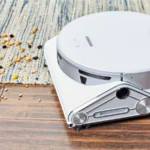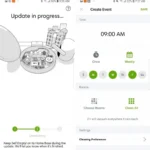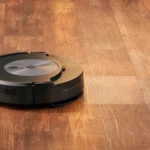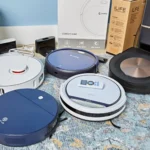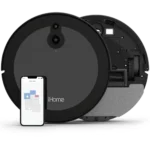Have you ever considered the quality of the air you breathe inside your home? It’s quite perplexing to think that the air we breathe indoors can be five times more polluted than outdoor air. That’s why it’s essential to take measures to improve indoor air quality. One of the best ways to do this is by incorporating smart vacuum cleaners with HEPA filters into your cleaning routine. In this article, we’ll explore what HEPA filters are, why indoor air quality is important, and how smart vacuum cleaners with HEPA filters can enhance the air you breathe. Let’s dive in!
What is HEPA Filter?
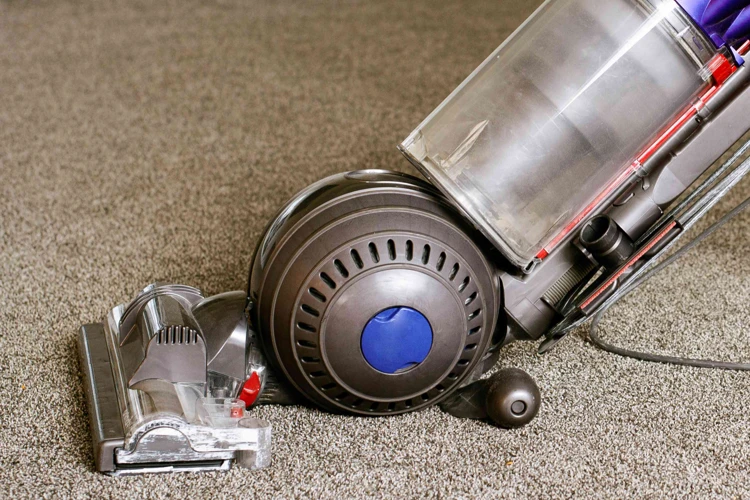
Indoor air quality is a growing concern for many homeowners. With the rise of allergies, asthma, and other respiratory issues, people are looking for ways to improve the air they breathe. One of the most effective ways to do so is by using HEPA filters in vacuum cleaners. Although many have heard of this technology, not everyone is familiar. So, let’s delve into the details and find out what HEPA filters are and how they can help improve your indoor air quality. But first, let’s address why it’s important to prioritize air purification and how smart vacuum cleaners play a crucial role in the process. To learn more about this, check out the importance of air purification with smart vacuum cleaners.
How Does HEPA Filters Work?
HEPA (High-Efficiency Particulate Air) filters work by trapping tiny particles that are present in the air. These filters consist of a mat of randomly arranged fibers made up of glass, fiber glass, or synthetic materials like polypropylene. As air passes through the filter, the particles are captured and held in these fibers.
To understand the efficiency of HEPA filters, it is important to note that they must capture particles as small as 0.3 microns, which includes many allergens, dust mites, and pet dander. For comparison, the diameter of a typical human hair is about 50 microns. This is why smart vacuum cleaners with HEPA filters are able to capture more pollution than regular vacuum cleaners, which sometimes release small particles back into the air.
One of the reasons HEPA filters are so effective is that they use several different methods to capture particles, including:
- Interception: this occurs when particles come into contact with the surface of the HEPA filter fibers and adhere to them.
- Impaction: larger particles will stay on the surface or become embedded in the HEPA filter fibers through impaction. This occurs when a particle is too large to be attracted to the fibers but is too large to avoid them entirely.
- Diffusion: this is when smaller particles are hit by air molecules and move in a zigzag pattern before being trapped by the fibers in the HEPA filter.
HEPA filters also undergo rigorous testing to ensure that they meet the standards set by the United States Department of Energy. To be considered a true HEPA filter, it must be able to capture at least 99.97% of particles that are larger than 0.3 microns.
HEPA filters are essential for cleaning the air in your home. By using filtration methods such as interception, impaction, and diffusion, HEPA filters can effectively capture even the smallest allergens and pollutants. When combined with a smart vacuum cleaner, you have a powerful tool in reducing allergens, improving respiratory health, and creating a healthier indoor environment.
What Are the Benefits of Using HEPA Filters?
HEPA filters have several benefits when it comes to improving indoor air quality. Let’s take a look at some of the main advantages of using HEPA filters in your cleaning appliances.
| Benefits of HEPA Filters |
|---|
| Traps Small Particles: HEPA filters can trap particles as small as 0.3 microns in diameter. This includes dust, pollen, pet dander, bacteria, and viruses. |
| Improves Air Quality: By improving the quality of the air you breathe, HEPA filters can reduce allergic reactions, asthma symptoms, and other respiratory problems. |
| Long-lasting: HEPA filters are durable and long-lasting. They don’t need to be replaced as often as other filters, reducing maintenance costs. |
| Affordable: Despite their effectiveness, HEPA filters are relatively affordable compared to other air purification systems. |
| Environmentally Friendly: HEPA filters don’t produce ozone or other harmful byproducts, making them environmentally friendly. |
With these benefits in mind, it’s clear that using HEPA filters is an effective way to improve the air quality in your home or office. When used in conjunction with smart vacuum cleaning technology, like those available on the market today, you can ensure that your indoor air is as clean and healthy as possible. To learn more about the benefits of smart vacuum cleaning, check out our article on the subject.
Why Indoor Air Quality Matters?
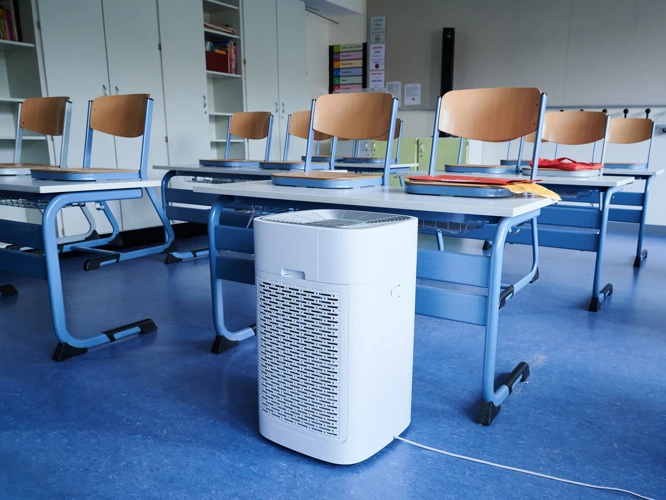
Indoor air quality should be a top priority for everyone, yet it is often overlooked. The air we breathe inside our homes or offices can be up to 5 times more polluted than outdoor air. Without clean air, we are putting our health at risk and inviting a variety of health issues into our homes and workplaces. In this section, we will explore the sources of indoor air pollution, why it is harmful, and how it can be improved.
Sources of Indoor Pollution
Indoor pollution can come from a variety of sources that we might not even be aware of. These sources can cause poor indoor air quality, leading to health issues like headaches, allergies, asthma, and even more serious conditions like heart disease and cancer. Here are some of the most common sources of indoor pollution:
- Cleaning products: Many household cleaning products, such as bleach and ammonia, contain chemicals that can be harmful to human health when inhaled.
- Cigarette smoke: Smoking indoors can release harmful particles and chemicals into the air, causing health problems for both smokers and non-smokers alike.
- Pet dander: Pets can shed hair, skin, and other allergens that can cause respiratory problems and allergic reactions in humans.
- Mold and mildew: Water damage or high humidity levels can create conditions that promote the growth of fungi, which can release spores into the air that can cause respiratory problems.
- Volatile organic compounds (VOCs): VOCs are found in many common household products, such as paints, carpets, and air fresheners. When these products are used or exposed to heat, they can release harmful chemicals into the air.
- Dust and dust mites: Dust can contain a variety of particles such as pollen, skin particles, and dust mites, which can trigger allergies and asthma.
These sources of indoor pollution might seem harmless until they accumulate over time, causing respiratory or allergy symptoms to develop. It is essential to minimize exposure to these pollutants by using safe cleaning products, smoking outside, keeping pets groomed and in designated areas, fixing water leaks, and reducing the use of air fresheners and scented products. Using a smart vacuum cleaner with a HEPA filter can also help reduce indoor pollutants and improve your indoor air quality.
Why Indoor Pollution is Harmful
Indoor pollution may not be visible to the naked eye, but it can have serious health consequences. Here are some reasons why indoor pollution is harmful:
- Respiratory problems: Indoor pollution can cause breathing difficulties, especially for those with asthma or allergies. The harmful particles can cause coughing, wheezing, and shortness of breath.
- Cancer: Exposure to indoor pollution has been linked to an increased risk of cancer, including lung cancer and leukemia.
- Cardiovascular disease: Indoor pollution can also lead to cardiovascular disease, including heart attacks and strokes. The harmful particles can enter the bloodstream and cause damage to the heart and blood vessels.
- Neurological problems: Indoor pollution has been shown to affect cognitive function, including memory and decision-making.
- Reproductive problems: Exposure to indoor pollution can also lead to reproductive problems, including infertility and birth defects.
It’s important to take indoor pollution seriously and take steps to improve the indoor air quality in your home. One effective way to do this is by using smart vacuum cleaners with HEPA filters, which can effectively filter out harmful particles and improve the air quality in your home.
What is Indoor Air Quality (IAQ) and How It is Affected by Pollutants?
Indoor Air Quality (IAQ) refers to the level of air purity inside a building. It is impacted by a range of factors, including contaminants from outside and inside sources like smoke, mold, pollen, dust, and other particulate matter. Some of the common indoor air pollutants and their sources are listed in the following table:
| Indoor Air Pollutant | Primary Sources |
|---|---|
| Radon | Rocks, soil, and building materials |
| Carbon Monoxide (CO) | Fuel-burning appliances, such as gas stoves, heaters, and fireplaces |
| Mold and Mildew | Dampness and moisture from poorly ventilated bathrooms, kitchens, and basements |
| Volatile Organic Compounds (VOCs) | Cleaning agents, paints, adhesives, and building materials |
| Allergens | Pet dander, dust mites, pollen, and mold spores |
Indoor air quality is crucial because poor IAQ can have significant consequences on human health. It can cause symptoms such as irritation of the eyes, nose, and throat, headaches, dizziness, fatigue, and even serious respiratory conditions such as asthma in the long run. The level of indoor pollution can be several times higher than the outdoors, making it imperative to improve IAQ.
HEPA filter equipped smart vacuum cleaners can play a vital role in improving indoor air quality. Their advanced filtration systems can remove a significant percentage of indoor pollutants and allergens. Additionally, smart vacuum cleaners offer convenience and can navigate autonomously, and with advanced features like smart scheduling and remote control, they are a powerful tool for combating indoor pollution.
How Smart Vacuum Cleaners with HEPA Filters Can Improve Indoor Air Quality
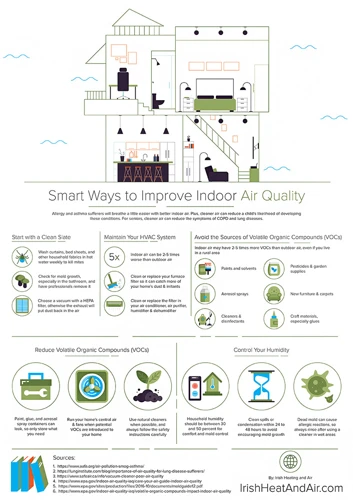
If you’re concerned about the air quality in your home, investing in a smart vacuum cleaner with a HEPA filter could be a wise decision. Not only do they help maintain a clean environment, but also improve the air quality by removing contaminants from your floors and carpets. With its advanced features, a smart vacuum cleaner with a HEPA filter can bring your cleaning game to the next level. Let’s take a closer look at how it works and why it is essential to improving indoor air quality.
How Smart Vacuum Cleaner Works with HEPA Filters?
Smart vacuum cleaners with HEPA filters work by using a combination of advanced technologies to improve indoor air quality. Here’s how it works:
- Capture: The vacuum cleaner’s suction system captures particles in the air, ranging from dust and pet hair to pollen and mold spores. The HEPA filter then traps these particles so they can’t escape back into the air.
- Filtration: The HEPA filter removes 99.7% of particles from the air, down to 0.3 microns in size. This means that even the smallest particles, such as smoke or viruses, can be caught by the filter.
- Sealing: To ensure that none of the trapped particles escape back into the air, smart vacuum cleaners with HEPA filters have a sealing system in place. This prevents particles from leaking out of the vacuum cleaner’s exhaust and finding their way back into your home.
- Purification: Some smart vacuum cleaners go a step further and include air purification technologies that can help clean the air even more thoroughly. These include UV-C lights that kill bacteria and viruses or activated carbon filters that absorb odors and chemicals.
Smart vacuum cleaners with HEPA filters are an essential tool for improving indoor air quality. They effectively capture, filter, seal, and purify the air in your home, making it a healthier and more comfortable place to be.
The Advantages of Smart Vacuum Cleaners with HEPA Filters:
Smart vacuum cleaners with HEPA filters are becoming increasingly popular among homeowners due to their numerous benefits for indoor air quality. Not only do they make cleaning more convenient and efficient, but they also help to improve the air quality in your home. In this section, we will explore the advantages of using smart vacuum cleaners with HEPA filters in-depth.
Below is a table summarizing the benefits of smart vacuum cleaners with HEPA filters:
| Advantages | Description |
|---|---|
| Effective Pollutant Filtration | Smart vacuum cleaners with HEPA filters are highly effective at trapping small particles such as dust, pet dander, and pollen, which can cause allergies and respiratory problems. This means that the air in your home will contain fewer harmful particles. |
| Reduces Exposure to Allergens | HEPA filters can capture up to 99.97% of airborne allergens, which means that people with allergies or asthma will experience fewer symptoms while indoors. This is especially important for those who spend a lot of time at home. |
| Kills Bacteria and Viruses | Smart vacuum cleaners with HEPA filters can also help to kill bacteria and viruses that may be lingering on surfaces or in the air. This is particularly important during flu season or if someone in your household is sick. |
Smart vacuum cleaners with HEPA filters are an excellent investment for those who are looking to improve the air quality in their homes. These devices have numerous benefits, including the effective filtration of pollutants, the reduction of allergens, and the ability to kill bacteria and viruses. By investing in a smart vacuum cleaner with a HEPA filter, you can promote a healthier living environment and breathe easier knowing that the air in your home is clean and safe.
- Effective Pollutant Filtration
- Reduces Exposure to Allergens
- Kills Bacteria and Viruses
Smart vacuum cleaners equipped with HEPA filters offer several benefits when it comes to improving indoor air quality. Here are some of the key advantages of using these types of cleaners:
Effective Pollutant Filtration: HEPA filters are known for their ability to trap small particles that are often missed by standard vacuum filters. They can capture tiny particles as small as 0.3 microns in size, including allergens, dust, pet dander, and other pollutants. By filtering these particles out of the air, a smart vacuum cleaner with a HEPA filter can help purify the air inside your home.
Reduces Exposure to Allergens: For allergy sufferers, a vacuum cleaner equipped with a HEPA filter can make a world of difference. By trapping allergens such as dust mites, pollen, and mold spores, these filters can help reduce exposure to these common triggers. This can lead to reduced symptoms such as sneezing, itching, and wheezing, and improve overall quality of life.
Kills Bacteria and Viruses: In addition to trapping pollutants and allergens, some smart vacuum cleaners with advanced features can even help kill bacteria and viruses. This is achieved through the use of UV-C lights or other advanced cleaning technologies. This added benefit can be especially useful for those with weakened immune systems, or during flu season when viruses can be particularly rampant.
A smart vacuum cleaner with a HEPA filter offers an efficient way to improve indoor air quality and promote a cleaner home environment. By effectively filtering pollutants, reducing exposure to allergens, and even killing bacteria and viruses, these vacuum cleaners offer several key advantages over traditional models.
Additional Features to Further Enhance Smart Vacuum Cleaners
As technology continues to advance, smart vacuum cleaners with HEPA filters are becoming an essential part of indoor air quality improvement. With the ability to effectively filter pollutants and reduce allergen exposure, these devices have become a popular choice for homeowners seeking a clean and healthy home. However, there are additional features that can take these devices to the next level. Let’s explore some of the cutting-edge technologies that further enhance smart vacuum cleaners and the benefits they bring to improving indoor air quality.
Artificial Intelligence (AI) or Machine Learning Capability
Smart vacuum cleaners with HEPA filters are already a great addition to maintaining indoor air quality, but integrating them with Artificial Intelligence (AI) or machine learning capability can take it to a whole new level.
- Effective Learning and Efficient Cleaning
AI or machine learning capability in smart vacuum cleaners means that they can learn and adapt to your home’s layout and cleaning needs. They use sensors and scanners to map out the area and create a layout that optimizes the cleaning process. Over time, they use this data to improve their cleaning patterns, making them more efficient in cleaning in the future.
- Customizable Settings
AI-enabled smart vacuum cleaners with HEPA filters can also be customized to your specific requirements. You can set them to clean individual rooms or sections of your home, or you can designate certain areas as no-go zones. This customization ensures that the vacuum cleaner only cleans areas that need cleaning, preventing unnecessary energy usage and collision damage.
- Scheduling and Alerts
Some smart vacuum cleaners with AI and machine learning also have the ability to learn and understand your schedule. This means that they can be set to clean at specific times during the day, without the need for manual intervention. Some models can even send alerts to your smartphone or smart home device, notifying you when cleaning is done or if there are any issues that need immediate attention.
- Improved Navigation
AI and machine learning technology also enables smart vacuum cleaners to navigate around your home more efficiently. They can detect and avoid obstacles, adjust cleaning speeds based on the amount of dirt, and return to their charging docks automatically when the battery runs low. This eliminates the need for manual adjustments, making cleaning more convenient and hassle-free.
AI or machine learning capability in smart vacuum cleaners with HEPA filters greatly enhances their cleaning abilities. They can learn your cleaning preferences, customize settings to your specific requirements, clean more efficiently, send notifications, and navigate around your home with ease. Investing in a smart vacuum cleaner with AI or machine learning capability not only improves your indoor air quality but also makes cleaning more convenient and personalized.
Remote Controllability
Having a smart vacuum cleaner with HEPA filters can definitely enhance indoor air quality, but having one that also has remote controllability can make cleaning even more convenient. With remote controllability, homeowners can operate the device from anywhere, making it easier to manage household cleaning tasks. Here are some of the benefits of having a smart vacuum cleaner with remote controllability:
- Convenience: With remote control, homeowners can easily turn the device on and off, program schedules, and adjust settings from a smartphone, tablet, or other mobile device.
- Efficiency: Using remote control to start the device can save time by starting cleaning quickly, even from a different room.
- Accessibility: For those with physical limitations or disabilities, the ability to control the device from a distance can make cleaning much easier and more accessible.
- Flexibility: With remote control, it’s easy to adjust the cleaning schedule or modify the device’s settings to fit individual cleaning preferences without having to be physically present.
- Peace of Mind: Remote control allows homeowners to check on the cleaning progress, ensure the device is still running, and receive notifications if it stops or requires maintenance.
Remote controllability can be a great feature for homeowners who want to take advantage of the convenience and flexibility that comes with owning a smart vacuum cleaner. By allowing homeowners to perform cleaning tasks from a distance, this feature can help to make household cleaning more efficient and accessible to all.
Smart Home Integration
Smart home integration is one of the key features of modern smart vacuum cleaners with HEPA filters. By integrating with smart home systems, such as Amazon Alexa or Google Home, these vacuum cleaners offer even greater convenience and control to users.
Benefits of Smart Home Integration:
| Benefits: | Explanation: |
| Convenience | Users can easily control the vacuum cleaner using voice commands or mobile apps. |
| Accessibility | Enables the elderly, people with disabilities or limited mobility to manage their cleaning tasks independently. |
| Automation | The vacuum cleaner can be programmed to start cleaning at specific times, or to specific rooms, enabling a hands-free cleaning experience. |
| Compatibility | Smart vacuum cleaners can be integrated with other smart home devices, such as smart thermostats or security systems, to create a more integrated and efficient home environment. |
Smart home integration also offers an additional layer of customization and control over the cleaning process. Users can create cleaning schedules, adjust settings, and even check the vacuum’s progress through their smart home assistant.
Smart home integration allows the vacuum cleaner to work in sync with other smart home devices, creating a more efficient and effective cleaning process. For example, a smart vacuum cleaner can work in tandem with a smart air purifier, tackling both dust and allergens to create a cleaner, healthier home environment.
The integration of smart home technology with HEPA filtered vacuum cleaners adds an extra layer of convenience and control for homeowners. By reducing the time and effort required to maintain a clean home, and enabling greater integration with other smart home devices, these vacuum cleaners are becoming increasingly popular for those looking to improve their indoor air quality in a smart and efficient manner.
Smart Scheduling and Navigation
Smart vacuum cleaners with HEPA filters are revolutionizing the way we clean our homes. These advanced devices offer much more than just effective pollutant filtration and allergen reduction, they also come equipped with smart features that simplify the cleaning process. One such feature is smart scheduling and navigation, which makes cleaning your home effortless and convenient.
So, what exactly is smart scheduling and navigation and how does it work? Essentially, it allows you to program your smart vacuum cleaner to clean your home at specific times of the day or week. This means that you can set your cleaner to run automatically, so you don’t have to manually start it every time you want to clean.
Smart scheduling and navigation is particularly useful if you have a busy lifestyle or if you have a large home that requires frequent cleaning. With this feature, you can simply set and forget your cleaner, allowing it to clean your home even when you’re not there. This is thanks to its advanced navigation systems, which allows it to move from room to room with ease.
But what are the advantages of smart scheduling and navigation for air quality?
Firstly, it ensures that your home is being cleaned regularly, which means that pollutants and allergens don’t have a chance to build up. This is particularly important for people with allergies or respiratory issues, as it can significantly improve indoor air quality.
Secondly, by scheduling your cleaner to run during the day, you can ensure that it doesn’t disturb your sleep at night. This is particularly useful if you have a noisy vacuum cleaner or if you’re sensitive to noise.
To take advantage of smart scheduling and navigation, you’ll need to choose a smart vacuum cleaner that has this feature. Many models on the market offer this feature, typically with accompanying smartphone apps that allow you to easily program and control your cleaner.
Here is a table listing some of the top smart vacuum cleaners with smart scheduling and navigation features:
| Brand | Model | Smart Scheduling and Navigation Features |
|---|---|---|
| iRobot | Roomba 980 | Customizable cleaning schedules and advanced mapping technology |
| Ecovacs | Deebot 500 | Multiple cleaning modes and automatic charging |
| Shark | IQ Robot Vacuum | Smart mapping and voice control compatibility |
As you can see, there are many smart vacuum cleaners with advanced scheduling and navigation features available on the market. By choosing a model with these features, you can ensure that your home is being cleaned regularly and effectively, without any hassle.
Smart scheduling and navigation is a key feature that can greatly enhance the effectiveness of your smart vacuum cleaner with HEPA filters. By choosing a model with this feature, you can ensure that your home is being cleaned regularly and effectively, without any hassle.
Multi-room Coverage
Smart vacuum cleaners with HEPA filters have revolutionized the way we clean our homes. One of the most convenient features of these devices is multi-room coverage. This feature allows the vacuum cleaner to move seamlessly from one room to another, without human intervention. It’s the ultimate hands-free cleaning solution that saves time and effort.
A smart vacuum cleaner with multi-room coverage uses advanced mapping technology and sensors to detect and navigate around obstacles in its path. It creates a map of the layout of your home or apartment and uses this information to plan the most efficient cleaning route. This means that it doesn’t just randomly bump into things or miss spots. Instead, it cleans your home in a structured and efficient manner, covering all areas in its path.
The multi-room coverage feature is particularly useful for larger homes or apartments. It saves you the hassle of moving the vacuum cleaner from room to room, and makes sure that every room in your home is cleaned thoroughly without missing any spots. The vacuum cleaner can also be programmed to clean certain rooms at specific times, making it even more convenient for you.
In addition to its convenience, a smart vacuum cleaner with multi-room coverage also contributes to better indoor air quality. As it moves from one room to another, it picks up dust, dirt, allergens, and other pollutants that can cause respiratory problems. These particles are then filtered through the HEPA filter, which captures up to 99.97% of particles as small as 0.3 microns. This means that the air in your home is fresher and cleaner.
The multi-room coverage feature is a game-changer when it comes to cleaning your home. It’s convenient, efficient, and contributes to better indoor air quality. It’s one of the reasons why smart vacuum cleaners with HEPA filters are becoming increasingly popular among homeowners who want clean and healthy homes.
| Pros | Cons |
|---|---|
|
|
Conclusion
In conclusion, it is evident that indoor air quality has a significant impact on our health and well-being. The sources of indoor pollution are numerous and can lead to a range of health issues, from simple allergies to more severe respiratory problems. HEPA filters are an essential way to combat indoor air pollution, and smart vacuum cleaners are an excellent means of implementing these filters.
By using a smart vacuum cleaner with a HEPA filter, you can effectively filter out pollutants and allergens from your indoor air. This can help to reduce the risk of allergies and respiratory problems, as well as improve the overall indoor air quality in your home. Additionally, these smart vacuum cleaners come with additional features, such as AI capabilities and remote controllability, making them even more effective.
Overall, investing in a smart vacuum cleaner with HEPA filters is a wise decision for anyone looking to improve their indoor air quality. Not only will it provide a cleaner living space, but it will also help to safeguard your health and well-being. So, don’t hesitate to upgrade your cleaning arsenal today and experience the many benefits of a smart vacuum cleaner with HEPA filters.
Frequently Asked Questions
1. How often should I change the HEPA filter on my smart vacuum cleaner?
It is recommended to change the HEPA filter every six months to maintain optimal air quality in your home.
2. Can smart vacuum cleaners with HEPA filters eliminate all allergens?
While smart vacuum cleaners with HEPA filters are highly effective at reducing allergens, they may not be able to remove 100% of all allergens present in the air.
3. Can smart vacuum cleaners with HEPA filters kill bacteria and viruses?
Yes, smart vacuum cleaners with HEPA filters have been shown to kill bacteria and viruses present in the air, helping to improve overall air quality in your home.
4. Are smart vacuum cleaners with HEPA filters more expensive than traditional vacuum cleaners?
Yes, smart vacuum cleaners with HEPA filters can be more expensive than traditional vacuum cleaners, but the benefits they provide for indoor air quality make them worth the investment.
5. Can smart vacuum cleaners with HEPA filters be programmed to clean multiple rooms?
Yes, many smart vacuum cleaners with HEPA filters have multi-room coverage capabilities, which means they can be programmed to clean several rooms in your home.
6. How does smart vacuum cleaner with HEPA filter compare to an air purifier?
While both devices improve indoor air quality, a smart vacuum cleaner with HEPA filter can remove pollutants from surfaces as well as the air, making them more effective in reducing allergens and bacteria in your home.
7. Can smart vacuum cleaners with HEPA filters be controlled remotely?
Yes, many smart vacuum cleaners with HEPA filters have remote control capabilities, allowing you to schedule and control cleaning from your phone or other device.
8. What is the difference between a HEPA filter and a standard air filter?
HEPA filters are designed to catch smaller particles than standard air filters, making them highly effective at capturing allergens, bacteria, and viruses.
9. Will a smart vacuum cleaner with HEPA filter replace regular cleaning?
No, while a smart vacuum cleaner with HEPA filter can greatly reduce allergens and pollutants in your home, it should not replace regular cleaning activities such as dusting and wiping surfaces.
10. Can smart vacuum cleaners with HEPA filters improve the air quality in a home with pets?
Yes, smart vacuum cleaners with HEPA filters can greatly improve the air quality in homes with pets by reducing pet dander and other allergens present in the air.

